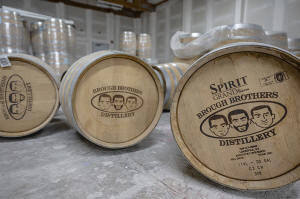Kentucky bourbon makers fear becoming 'collateral damage' in Trump's
trade war
[March 11, 2025] By
BRUCE SCHREINER and DYLAN LOVAN
LOUISVILLE, Ky. (AP) — With a new distillery set to open soon, the
makers of Brough Brothers bourbon in Kentucky were ready to put their
business plan into action. They were looking to ramp up whiskey
production to break into lucrative new markets in Canada and Europe.
Now the on-again, off-again threat of tariffs has disrupted those plans.
Efforts by the Black-owned distiller to gain a foothold in Canada are on
hold, as are plans to break into Germany and France, said Brough
Brothers Distillery CEO Victor Yarbrough. That's because the iconic
American spirit's widening global appeal is caught in the crossfire of
trade conflicts instigated by President Donald Trump.
"It’s extremely frustrating,” said Yarbrough, who started the Louisville
distilling company with his brothers, Bryson and Chris. “We are
collateral damage.”
For distillers looking to sell to consumers of all political stripes,
talking politics can be as distasteful as discussing Prohibition. But
along with the turmoil and uncertainty over tariffs, bourbon makers and
other U.S. firms trying to do business in Canada are confronting public
relations challenges still reverberating from the president's
blunt-force “America First” approach to international relations.
With Canadian hockey fans booing the U.S. national anthem and some
liquor stores north of the border clearing American spirits from their
shelves even before there’s clarity over tariffs, businesses like Brough
Brothers are watching to see how the trade conflict plays out.
In the building being converted into the new distillery near the Ohio
River, drywall dust covers the floor of the project that the brothers
hope will raise the company's profile in the ultra-competitive bourbon
world.

“I believe there’s going to be some type of repair of the relationships
that needs to happen," said Yarbrough, who was hoping, before the trade
war erupted, to introduce his bourbon in New Brunswick and later expand
to Ontario and other parts of Canada. "So I think some type of media
blitz, PR blitz is definitely going to have to take place.”
An expanding market hampered by uncertainty
The trade wars pose an immediate threat to an American-made success
story, built on the growing worldwide taste for bourbon, Tennessee
whiskey and other products.
Kentucky Democratic Gov. Andy Beshear said the president's zig-zagging
tariff policy is hurting the American economy and will lead to higher
consumer prices while disrupting business.
“It’s not just the imposition of tariffs, it’s this month-to-month, ‘I
may do it to you at any moment’ policy,” said Beshear, a potential
presidential candidate in 2028. “You can't create stability.”
Trump on Thursday postponed 25% tariffs on some imports from Canada for
a month amid fears of the economic fallout from a broader trade war.
Yarbrough said his company's expansion plans are still in limbo.
“It doesn’t change our situation," he said. “Just as quickly as it
changed to a reprieve, it could just as quickly turn into next month
that we’re back on.”
For an industry that has to plan well into the future, based on aging
its whiskey products, such angst is widespread in Kentucky, which
produces 95% of the world's bourbon supply. At this point even a delay
in tariffs wouldn't alleviate the practical problems confronting U.S.
whiskey makers.
“The issue for us is long-term planning, and a postponement does nothing
for us in long-term planning except leaves it still up in the air," said
Judy Hollis Jones, president and CEO of Buzzard's Roost in Louisville,
which sells to two provinces in Canada and has been looking to expand.
“Maybe other people adapt to it easier than I do, but I tend to like
some certainty," Jones said.
The Kentucky Distillers' Association says the newest trade conflicts
feel like deja vu. The industry group has long sounded the alarm that
tariffs and retaliatory levies would wreak havoc on the spirits
industry. Along with the North American trade dispute, the European
Union is set to reinstate a tariff by April 1 on American whiskey if
nothing is done to head it off.

[to top of second column] |

Bourbon barrels with product in them are seen inside of the Brough
Brothers Distillery that is under construction in Louisville, Ky.,
Saturday, March 8, 2025. (AP Photo/Jon Cherry)
 That trans-Atlantic dispute is a
reprise of Trump’s first-term tariffs on European steel and
aluminum. The EU’s retaliatory tariff caused American whiskey
exports to the EU to plunge 20%, costing distillers more than $100
million in revenue from 2018 to 2021, the Distilled Spirits Council
says. Once the tariff was suspended, EU sales rebounded for American
distillers.
Threat of ‘irreparable harm’ to distillers
Now, Europe's infatuation with Kentucky bourbon and other U.S.
spirits is threatened by the potential 50% tariff — double the
previous levy — that would inflict "irreparable harm to distillers
large and small,” said Chris Swonger, the council’s CEO.
Tariffs amount to a tax, which whiskey producers can either absorb
in reduced profits or pass along to customers through higher prices
— and risk losing market share in highly competitive markets. In
2024, the EU was by far the largest export market for U.S. distilled
spirits, followed by Canada, the council said.
Trump maintains that open trade has cost the U.S. millions of
factory jobs and that tariffs are the path to American-made
prosperity.
Large distillers possess the capital and market reach to ride out
disruptions caused by tariffs — built-in luxuries that most small
producers don't have.
Canada accounts for just 1% of total sales for Brown-Forman Corp.,
the maker of Jack Daniel's Tennessee Whiskey, and the
Louisville-based company could withstand disruptions there, said its
CEO, Lawson Whiting.
But Whiting said the decision by Canadian provinces to take American
products off store shelves is “worse than a tariff because it’s
literally taking your sales away.” He called it “a very
disproportionate response to a 25% tariff.”
The threat of a prolonged trade war has Brough Brothers exploring
other options. They could lean harder into domestic sales or look
for other markets overseas — but again, it's hard to plan.
“Talking about this is starting to make my head hurt,” Yarbrough
said.
For Tom Bard, another Kentucky craft distiller, the risk is that all
his hard work to gain a foothold in Canada could evaporate due to
the cross-border trade conflict.
Bard and his wife, Kim, own The Bard Distillery in Muhlenberg County
in western Kentucky. Their products had penetrated British Columbia
and Alberta, but a new purchase order for north of the border is on
hold amid Trump's ever-changing trade war.

“That hurts,” Bard said. “For a small distillery like us, where
every single pallet that goes out the door makes a huge difference,
that’s huge for us.”
Bard said his team invested heavily to break into Canada, where
business grew so quickly that he had hoped it would account for at
least 25% of his overall sales this year.
“We’d love to ship as much of it as we can to Canada,” Bard said.
“We just expanded our distillery to take advantage of all the global
demand for our products. What we hate is that once we get this
equipment online this year, that we won’t be able to run it full
throttle because we’ll be afraid to put too much inventory away not
knowing what’s going to happen."
The dispute needs to be resolved before Canadian distributors will
risk accepting shipments of American spirits, he said.
Bard plans to ramp up domestic distribution to try to make up for
lost sales in Canada.
“We’re small-business Americans, so we’re going to make it work,” he
said. “But it would be nice to not have these roadblocks.”
___
Associated Press writer Paul Harloff in New York contributed to this
report.
All contents © copyright 2025 Associated Press. All rights reserved |